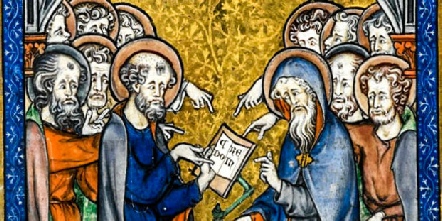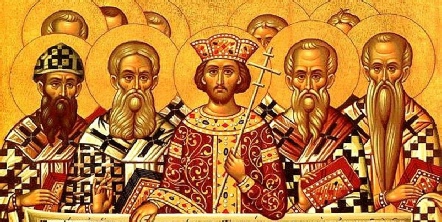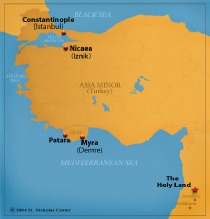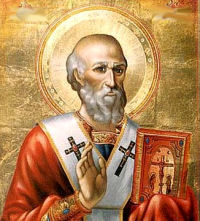

Holy Trinity
Amblecote
Creeds
A creed (also known as a confession, symbol, or statement of faith) is a statement of the shared beliefs of a religious community in the form of a fixed formula summarizing core tenets.
Within Anglicanism there are three creeds.

The Apostle’s Creed
The title Symbolum Apostolicum (Symbol or Creed of the Apostles) appears for the first time in a letter, probably written by Ambrose, from the Council in Milan to Pope Siricius in about AD 390 "Let them give credit to the Creed of the Apostles, which the Roman Church has always kept and preserved undefiled".
I believe in God, the Father almighty,
creator of heaven and earth.
I believe in Jesus Christ, his only Son, our Lord,
who was conceived by the Holy Spirit,
born of the Virgin Mary,
suffered under Pontius Pilate,
was crucified, died, and was buried;
he descended to the dead.
On the third day he rose again;
he ascended into heaven,
he is seated at the right hand of the Father,
and he will come to judge the living and the dead.
I believe in the Holy Spirit,
the holy catholic Church,
the communion of saints,
the forgiveness of sins,
the resurrection of the body,
and the life everlasting.
Amen.
The Nicene Creed

The Nicene Creed
It is called Nicene because it was originally adopted in the city of Nicaea by the First Council of Nicaea in AD 325. In 381 AD, it was amended at the First Council of Constantinople, and the amended form is referred to as the Nicene or the Niceno-
WE BELIEVE in one God,
the Father, the Almighty,
maker of heaven and earth,
of all that is, seen and unseen.
We believe in one Lord, Jesus Christ,
the only Son of God,
eternally begotten of the Father,
God from God, Light from Light,
true God from true God,
begotten, not made,
of one Being with the Father.
Through him all things were made.
For us and for our salvation
he came down from heaven:
by the power of the Holy Spirit
he became incarnate from the Virgin Mary,
and was made man.
For our sake he was crucified under Pontius Pilate;
he suffered death and was buried.
On the third day he rose again
in accordance with the Scriptures;
he ascended into heaven
and is seated at the right hand of the Father.
He will come again in glory to judge the living and the dead,
and his kingdom will have no end.
We believe in the Holy Spirit, the Lord, the giver of life,
who proceeds from the Father and the Son.
With the Father and the Son he is worshiped and glorified.
He has spoken through the Prophets.
We believe in one holy catholic and apostolic Church.
We acknowledge one baptism for the forgiveness of sins.
We look for the resurrection of the dead,
and the life of the world to come.

The Athanasian Creed

A Latin document composed in the Western Church, the creed was unknown to the Eastern Church until the 12th century. Since the 17th century, scholars have generally agreed that the Athanasian Creed was not written by Athanasius (died 373) but was probably composed in southern France during the 5th century.
Saint Athanasius of Alexandria or Saint Athanasius the Apostolic, (born c. 293, Alexandria—died May 2, 373, theologian, ecclesiastical statesman, and Egyptian national leader. He was the chief defender of Christian orthodoxy in the 4th-
Whoever desires to be saved should above all hold to the catholic faith.
Anyone who does not keep it whole and unbroken will doubtless perish eternally.
Now this is the catholic faith:
That we worship one God in trinity and the trinity in unity,
neither blending their persons
nor dividing their essence.
For the person of the Father is a distinct person,
the person of the Son is another,
and that of the Holy Spirit still another.
But the divinity of the Father, Son, and Holy Spirit is one,
their glory equal, their majesty coeternal.
What quality the Father has, the Son has, and the Holy Spirit has.
The Father is uncreated,
the Son is uncreated,
the Holy Spirit is uncreated.
The Father is immeasurable,
the Son is immeasurable,
the Holy Spirit is immeasurable.
The Father is eternal,
the Son is eternal,
the Holy Spirit is eternal.
And yet there are not three eternal beings;
there is but one eternal being.
So too there are not three uncreated or immeasurable beings;
there is but one uncreated and immeasurable being.
Similarly, the Father is almighty,
the Son is almighty,
the Holy Spirit is almighty.
Yet there are not three almighty beings;
there is but one almighty being.
Thus the Father is God,
the Son is God,
the Holy Spirit is God.
Yet there are not three gods;
there is but one God.
Thus the Father is Lord,
the Son is Lord,
the Holy Spirit is Lord.
Yet there are not three lords;
there is but one Lord.
Just as Christian truth compels us
to confess each person individually
as both God and Lord,
so catholic religion forbids us
to say that there are three gods or lords.
The Father was neither made nor created nor begotten from anyone.
The Son was neither made nor created;
he was begotten from the Father alone.
The Holy Spirit was neither made nor created nor begotten;
he proceeds from the Father and the Son.
Accordingly there is one Father, not three fathers;
there is one Son, not three sons;
there is one Holy Spirit, not three holy spirits.
Nothing in this trinity is before or after,
nothing is greater or smaller;
in their entirety the three persons
are coeternal and coequal with each other.
So in everything, as was said earlier,
we must worship their trinity in their unity
and their unity in their trinity.
Anyone then who desires to be saved
should think thus about the trinity.
But it is necessary for eternal salvation
that one also believe in the incarnation
of our Lord Jesus Christ faithfully.
Now this is the true faith:
That we believe and confess
that our Lord Jesus Christ, God's Son,
is both God and human, equally.
He is God from the essence of the Father,
begotten before time;
and he is human from the essence of his mother,
born in time;
completely God, completely human,
with a rational soul and human flesh;
equal to the Father as regards divinity,
less than the Father as regards humanity.
Although he is God and human,
yet Christ is not two, but one.
He is one, however,
not by his divinity being turned into flesh,
but by God's taking humanity to himself.
He is one,
certainly not by the blending of his essence,
but by the unity of his person.
For just as one human is both rational soul and flesh,
so too the one Christ is both God and human.
He suffered for our salvation;
he descended to hell;
he arose from the dead;
he ascended to heaven;
he is seated at the Father's right hand;
from there he will come to judge the living and the dead.
At his coming all people will arise bodily
and give an accounting of their own deeds.
Those who have done good will enter eternal life,
and those who have done evil will enter eternal fire.
This is the catholic faith:
one cannot be saved without believing it firmly and faithfully.